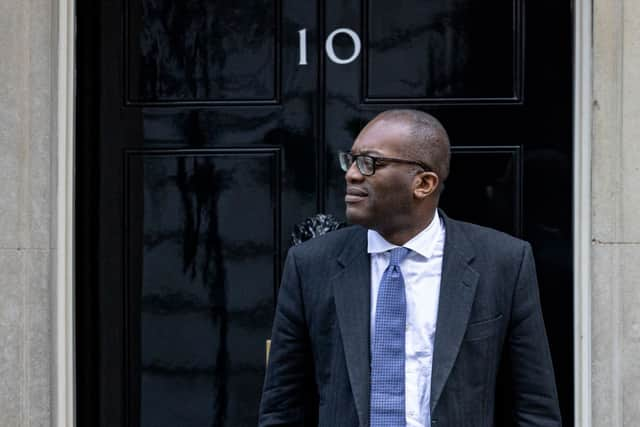Kwasi Kwarteng to deliver mini budget ‘focused on growth’ with plans for increased spending and tax cuts
and live on Freeview channel 276
Kwasi Kwarteng will today pledge to “turn the vicious cycle of stagnation into a virtuous cycle of growth” as he sets out the new government’s approach to the UK economy.
The Chancellor is set to announce tens of billions of pounds of increased spending and tax cuts in his mini-budget at around 9.30am on Friday (23 September).
Advertisement
Hide AdAdvertisement
Hide AdThe government is dubbing the announcement a “growth plan” of some 30 measures which is expected to include details of how it will fund the energy price cap for households and businesses, and put into practice the Prime Minister’s tax-slashing promises.


Mr Kwarteng is expected to tell the House of Commons: “Growth is not as high as it needs to be, which has made it harder to pay for public services, requiring taxes to rise.
“This cycle of stagnation has led to the tax burden being forecast to reach the highest levels since the late 1940s.
“We are determined to break that cycle. We need a new approach for a new era focused on growth.”
Advertisement
Hide AdAdvertisement
Hide AdHe will say that this will deliver enough revenue to fund public services, and allow Britain to compete with other leading economies.
What tax cuts is he expected to announce?
The Chancellor already confirmed ahead of his mini-budget that the national insurance hike introduced by Boris Johnson’s government to pay for social care and tackling the NHS backlog will be reversed.
He is also set to axe the planned increase in corporation tax from 19% to 25%, and scrap the cap on bankers’ bonuses as part of wider City deregulation.
Mr Kwarteng will also reportedly cut stamp duty in an attempt to drive growth, and proposals to fast-track a scheduled 1p cut to income tax and to slash VAT from 20% to 15% across the board are reportedly also being considered.
Advertisement
Hide AdAdvertisement
Hide AdThe government is in talks with local authorities in the West Midlands, Tees Valley, Somerset and other regions to establish new investment zones – areas with lower taxation and planning rules, the Chancellor is to announce.
He also wants new measures to speed up around 100 major infrastructure projects, including new roads, railways and energy projects, by watering down environmental assessments and other regulations.
In a shake-up of the welfare system, Mr Kwarteng could reportedly announce that 120,000 Universal Credit claimants will have to take active steps to find work or lose benefits.
What’s been said about the plans?
Some economists have warned about the sharp rise in government borrowing to fund the plans, with the Institute for Fiscal Studies saying the strategy to drive growth was “a gamble at best” and that ministers risked putting the public finances on an “unsustainable path”.
Advertisement
Hide AdAdvertisement
Hide AdLabour also warned of increased risk and said the plans followed 12 years of “low growth and plummeting living standards”.
Pat McFadden, shadow chief secretary to the Treasury, said: “The Conservatives don’t have a new plan for economic growth. They have simply moved from levelling up to trickle down and that has not worked in the past.
“Their choice to fund all of this through borrowing and not attempt to fund even a proportion of it through a windfall tax on the energy companies making the most from the current crisis increases risk and leaves British taxpayers paying more for longer.
“They are doing all of this at a time when inflation is high and interest and mortgage rates are already on the rise.”
Advertisement
Hide AdAdvertisement
Hide AdIt comes after the Bank of England on Thursday hiked interest rates to 2.25% – their highest in more than 13 years – and indicated it believes the economy is already in recession.
Governor Andrew Bailey warned Mr Kwarteng in a letter that interest rates might have to be raised even further to curb the extra demand caused by his new tax cuts. He also said that the government’s energy price guarantee risked adding to “inflationary pressures in the medium term”.
In response, Mr Kwarteng challenged the central bank to “continue to take the forceful action necessary” to rein in near-double digit inflation.
Comment Guidelines
National World encourages reader discussion on our stories. User feedback, insights and back-and-forth exchanges add a rich layer of context to reporting. Please review our Community Guidelines before commenting.
